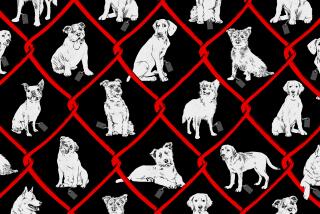Natural Pet Food Idea Proves as Good as Gold : Royalty, Movie Stars and Just Plain Pooch Lovers Swear by Ex-Teacher’s Special Animal Chow Blend
- Share via
SAN DIEGO — From the fog of London to the glitter of Hollywood to the sands of the Sahara, there are no boundaries for Sissy Harrington-McGill and her holistic pet food. Whether it’s royalty’s horses, a celebrity’s chow chow or a sheik’s camel, when pampered pets get hungry, their concerned owners look to El Cajon.
What started out as a small dog food business in 1974 out of Harrington-McGill’s La Mesa home has now turned into a multipurpose pet product center--Solid Gold Animal Nutrition Center at 1483 Cuyamaca St.
So what makes the Queen of England and so many other celebrities go for the Gold? The answer is in the food’s ingredients, some of which are said to be unique to the pet world.
Stumbled Upon Business
According to Harrington-McGill, her introduction to the pet products field came by accident while searching overseas for Great Danes.
“I bred Great Danes as a hobby,” Harrington-McGill said. “After losing three of them to bloat, I decided to go to Germany to buy another. I visited 44 kennels until I found the dog I was looking for. In fact, I bought two of them.”
While there, she asked the owner of the kennel, Baron Hans-Georg von Maischack, if he knew what caused bloat. To her surprise, he said he had never heard of the canine ailment because it doesn’t exist in Germany.
Bloat, according to Dean Gahring, president of the San Diego County Veterinary Assn., kills about 500 dogs a week in the United States. The specific cause is unknown, he said, but it’s mainly because of gastric torsion--where the stomach twists from 90 to 100 degrees or more, causing the juncture between the stomach and the esophagus, and the stomach and small intestines to close.
“I couldn’t believe he had never heard of it.” Harrington-McGill said. “There wasn’t even a word for it. This baffled both me and the kennel owner, so we began to explore the cause of bloat.”
After the two talked, they discovered that dogs in Germany and the United States have different diets. German dog food contains mainly fish and no animal fat, preservatives or soybeans. In the United States, some of the main ingredients are chicken, animal fat, sugar and soybeans.
Her conviction that bloat stemmed from dietary differences led Harrington-McGill to purchase a recipe Von Maischack had developed over the years.
“Since Great Danes were originally from Germany, it made sense to me that they should eat the food they had eaten for generations,” she said. “I wasn’t sure if diet was the main cause for the ailment, but it sounded like the most logical one.”
After buying two Great Danes, and with her new dog food recipe in hand, she returned to this country. For several months after that, she crisscrossed the states in search of a mill that would put together her formula.
“It was really hard to get anybody interested in making this formula,” she said. “It wasn’t the ingredients, it was the quantity and type of kibble I wanted. I just wanted it for my dogs, so I only needed a little, but most manufacturers said they didn’t work with small amounts.”
Harrington-McGill said she decided to “play it their way,” and, after finding a receptive mill in Los Angeles, she placed a 10-ton order for small-pellet, hard-baked kibbles.
Pleased with the outcome, she said she continued feeding her dogs the kibble and noticed how well they responded to it. Apparently, she wasn’t the only one to notice.
“When I was showing my Great Danes at dog shows, people would comment on their gleaming coats and asked what I was feeding them,” she said. “That’s the first thing people ask when they see a dog in good condition.”
After a couple of months, she had several people asking her if she could “throw in an extra bag of kibble” when ordering her dogs’ food from the mill.
“In the begining, I had extra bags so I gave some to my friends,” said Harrington-McGill, who was working then as an elementary school teacher. “But, after a while, I had to put in larger orders to accommodate everyone.”
By the end of 1974, she was ordering 4 to 5 tons of kibble monthly. Realizing that there were tantalizing business possibilities, she decided to test her dog-food formula to see what form was most marketable.
During those experiments, she said, she found that the hard-baked kibble sold best.
“It was such a new concept, no one in the United States had anything like it,” she said.
By 1978, when Harrington-McGill’s monthly manufacturing total had reached 7 tons, she resigned from her teaching position to give full-time attention to her dog-food venture. She also began selling food products for cats, horses and other animals.
“You are what you eat, and that goes for animals, too,” she said. “Most people really care about their animals, so why not give them the best?”
Harrington-McGill started a mail-order business and offered products such as Seal Meal, Herbal Wormer, Natural Flea Powder and Natural Flee Shampoo. Initially, she ran the business out of her home and a rented warehouse, but in 1984 she moved to her present location in El Cajon, where, in addition to the food, she also sells a animal accessories.
As business grew, so did her marketing strategies. While attending a trade show in England, she said she sneaked through an unopen gate in the back of Buckingham Palace in an attempt to give her products to Queen Elizabeth II.
“I couldn’t believe I got in there,” she said. “But, as soon as I was in, a guard caught me and asked me what I wanted. I quickly showed him two of my products and asked him if he could give the samples to Her Majesty.”
Although the guard assured her that he would do so, Harrington-McGill left assuming that he would simply discard her samples after she was gone. Three weeks later, however, she was shocked when she received a $1,700 telephone order from Buckingham Palace for a product called Solid Gold Golden Edge, which contains natural herbs believed to induce calm in animals.
Through word of mouth, her products soon came to the attention of other royalty and celebrities. Shortly after the queen’s order was placed, she received a call from a man she described as an Arab sheik asking for $2,200 worth of her products. Over the years, her client list grew to include such notables as Frank Sinatra, Zsa Zsa Gabor, William Shatner, Stephanie Powers and director John Frankenheimer.
Most of her clients, however, are everyday people with the same goal in mind that she had at the outset: finding healthy food for their pets. Today, about 80% of her business is conducted by mail order. The rest of her sales occur at her El Cajon store and other outlets throughout the county.
Whether Solid Gold is the stuff of a health-minded dog owner’s dream or just one more entrepreneurial spin in in the crowded animal products market is hard to say now. Dean Gahring said he wouldn’t rule it out that Solid Gold is all Harrington-McGill says it is, but there no studies have been done to confirm it.
In the meantime, business has been so good, Harrington-McGill said she hasn’t had time to think about it.
“It’s all happened so rapidly, I’m too busy to be surprised,” she said. “I just keep working at it.”
More to Read
Sign up for Essential California
The most important California stories and recommendations in your inbox every morning.
You may occasionally receive promotional content from the Los Angeles Times.













